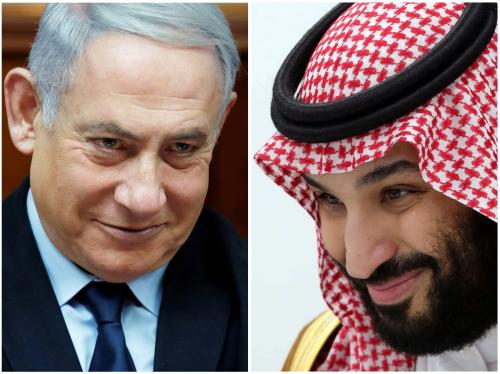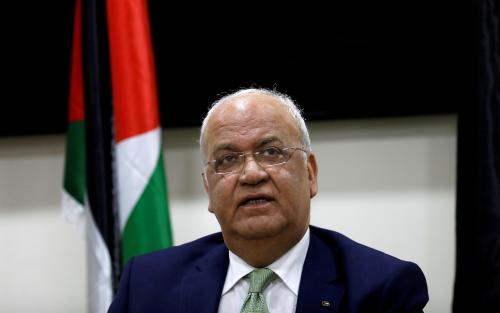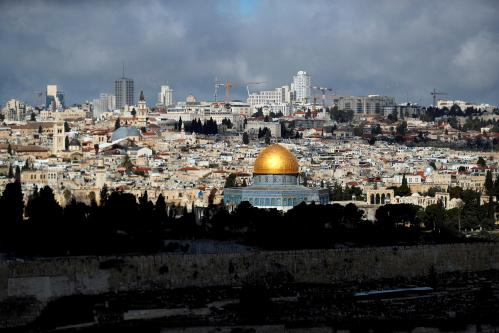As the Biden administration prepares to take office, one issue unlikely to be front-of-mind is the century-old conflict over the Holy Land. Despite a historic breakthrough in 1993 and many rounds of peace talks since, the Israeli-Palestinian conflict is far from resolved. Israel continues its occupation and territorial expansion in the West Bank and East Jerusalem, with hundreds of thousands of settlers now living beyond the 1967 borders and a majority of the current Israeli parliament prepared, in principle, to support annexing West Bank territory unilaterally.
Meanwhile, Palestinian governing institutions are eroding, opaque, and unaccountable, while the Palestinian political leadership and people are divided between an extremist Hamas in Gaza and a weakening Fatah-led Palestinian Authority (PA) in the West Bank. Economic and political inequality between Israelis and Palestinians, most starkly in Gaza, further exacerbates the conflict between them. And as Israelis and Palestinians increasingly live in separate spaces, the views on all sides of the conflict are hardening.
This week, I released a new report, co-authored with colleagues Ilan Goldenberg and Michael Koplow, proposing a new U.S. policy toward the Israeli-Palestinian conflict rooted in an imperative to take certain tangible steps, both on the ground and diplomatically.
Some analysts argue that there is no available negotiated solution between Israelis and Palestinians at the present time, and so the United States should focus on other issues and work simply to manage the conflict and prevent outbreaks of violence. We disagree. The current situation between Israelis and Palestinians, and between the Israeli government and the Palestinian Authority, is not stable — it is degrading in various ways. This backsliding causes daily harm, including violence, to Israelis and Palestinians living with the conflict, and also shapes the context in which the Palestinian national movement will undergo a high-stakes leadership succession in the coming period. Palestinians are forced to live with the daily humiliations of occupation, while for Israelis, perpetuating the occupation is causing an erosion of democratic values and deep internal political upheaval. Managing the conflict over the past decade has involved three major and several other minor conflagrations between Israel and Hamas, wars that have cost lives, degraded human development, destroyed physical infrastructure, and impaired economic growth. The United States can and must do more to improve the quality of life for Israelis and Palestinians now, while creating more favorable conditions for future negotiations.
Donald Trump’s administration fundamentally undercut the U.S. role in Israeli-Palestinian peacemaking by taking a one-sided approach, rejecting core principles that underlay Arab-Israeli peace for decades, and aligning the United States with Israeli far-right policies while freezing out the Palestinians. But U.S. policy in the pre-Trump era, under Presidents Bill Clinton, George W. Bush, and Barack Obama, also failed to produce lasting peace, and a simple return to those policies will not succeed. U.S. domestic politics are likely to change the American role as well. As political polarization colors American public attitudes toward Israel and its policies in the conflict, it creates both new constraints and opportunities for U.S. policy.
For decades, the American focus has been on high-profile diplomatic initiatives that aimed for a permanent agreement in which the United States is the central mediator. The quest for a final-status agreement often led American policymakers to give short shrift to the daily harm the ongoing conflict causes to Israelis and Palestinians: the insecurity, violence, economic hardship, and stunted hopes for the future. And that daily harm has itself undermined Israelis’ and Palestinians’ faith in the possibility of coexistence, and their willingness to push forward toward a negotiated peace.
So if no Nobel prize is in the offing for solving the Israeli-Palestinian conflict, but the status quo is too painful and risky to allow, what is the incoming administration to do? Today’s realities demand that the United States change its approach to the Israeli-Palestinian conflict from one focused on a quick resumption of negotiations toward conflict-ending agreement. The United States must focus on taking tangible steps, both on the ground and diplomatically, that will improve the freedom, prosperity, and security of all people living between the Mediterranean Sea and the Jordan River, while also cultivating the conditions for a future two-state agreement negotiated between the parties.
In the report, we argue that U.S. policy should focus on the following objectives:
- Prevent conflict and preserve the stability and security of U.S. partners;
- Promote freedom, security, and prosperity for all people living between the Mediterranean Sea and the Jordan River, both in the immediate term and in a final Israeli-Palestinian agreement; and
- Preserve and advance the vision of a negotiated solution between Israelis and Palestinians that brings about a mutually agreed end of conflict.
To advance those goals, the report lays out a plan that focuses on three central lines of effort:
- Tackle pressing issues that threaten any possibility of progress in addressing the conflict and keep the United States from playing a constructive role;
- Pursue concrete steps to meaningfully improve freedom, security, and prosperity for Israelis and Palestinians, and advance the prospects of an agreed two-state solution to the conflict over the medium term; and
- Reshape the U.S. role for greater persistence and impact, through adjusting both how the United States engages with the parties and the rest of the world on this issue, and how its own policymaking process is organized.
You can find the executive summary and a link to the full report here. I hope the report will win a hearing with audiences in Washington, Jerusalem, and Ramallah alike.







Commentary
On the Israeli-Palestinian conflict, practical steps are more important than grand visions
December 18, 2020